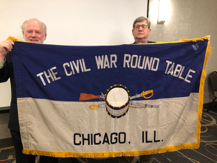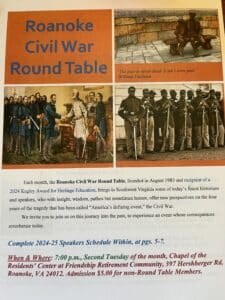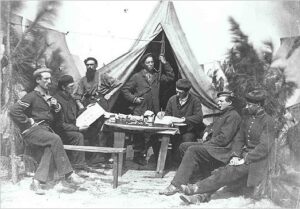Ensuring The Future of the Past: Continuing The Viability of Civil War Round Tables
“The past is never dead. It isn’t even past.” William Faulkner, Requiem for a Nun.
As time moves forward, past events fade into the distance, as surely as we lose sight of objects in a rearview mirror. Yet there are paths available back to what might otherwise be lost in time. We have our personal memories. Books recount history. Monuments commemorate past events or people. Cemeteries preserve and sometimes highlight the remains of long-ago heroes. And our national battlefield parks are wonderful open-air classrooms furnishing windows into history.
Then are those who elect to speak about the past. Today we have innumerable podcasts, broadcast interviews of experts, and conferences—such as Emerging Civil War’s annual Symposium—that bring together multiple speakers on selected topics.
It is within the Civil War community, however, that exists one of the most unique forums employed to recover the past: the Civil War Round Table. The Round Table concept launched in 1940, in Chicago.[1] Hundreds of Round Tables subsequently sprouted across the country. Round Table meetings typically revolve around a featured speaker, sometimes an academic or author, a Park Ranger or a member of the Round Table itself, who explore and bring to light some aspect of the War. Round Tables are one of the most powerful engines driving Civil War remembrance and understanding, keeping alive the people and deeds of that remarkable era.

A powerful advantage of the Round Table approach to learning about our Civil War past is that each Round Table is embedded in its community. They are local, easily accessible. Attendance does not require extended travel nor the cost of an overnight stay (often associated with conference attendance).
While regular Round Table members typically pay dues to cover speaker and other expenses, the non-member public is welcome. Attendance fees typically are low if charged at all. (My own local Roanoke Civil War Round Table only recently started charging $5.00 for non-member attendance).
Perhaps most important, the Round Table format allows—indeed encourages—direct personal interaction with the speaker. This writer’s experience is that those who present on the Civil War fervently love their topic and relish the question-and-answer session following their talk. And the fact that the attendees are interested enough to participate in the Round Table invariably means that they are eager to learn more, and sometimes even challenge the speaker’s perspective. Lively, informative and enjoyable talks result. Participants leave with a greater understanding of some aspect of the Civil War, sometimes even motivated to delve deeper into the topic by further reading or research. In that sense, the past has not only been preserved, but resurrected, in the public mind.
Despite their advantages in preserving Civil War history, however, many Round Tables face challenges to their continued existence. The CWRT Congress, whose mission “is to inspire Civil War Round Table leaders to adapt, adopt, and maintain strategies for sustainability,” has identified 133 groups that have closed (or appear to be defunct).[2]
COVID interrupted meetings, breaking social ties and momentum. “Aging out” of membership, coupled with the failure to attract younger members, is a frequently cited Round Table problem.[3] Parents have a myriad of children’s sports and other activities competing for their time. And it may be that recent controversies over certain Civil War era monuments have put off some who are not familiar with the true mission of Round Tables.
Yet the Round Table concept not only is well worth preserving as a vital portal to the past, its continued existence in the face of challenges is achievable, as shown by this writer’s own Round Table experience. Two years ago, the Roanoke [Virginia] Civil War Round Table faced its own post-COVID crisis, with attendance sometimes dwindling to 10-12 attendees amid concern about the group’s future. Today, we have rebounded and are growing, with 56 paid members.
How was this turnaround accomplished? By doing what Round Tables do best—shining a light on our Civil War past, in this case by turning a spotlight on our own Civil War educational mission. Not being flush with greenbacks, we created a colorful brochure off a laptop, highlighting our purpose and our wonderful line up of great speakers, along with a gallery of past topics covered, all showing the breath of our offerings (“it’s not just battles”). Keith Rocco, the celebrated Civil War artist, graciously gave us permission to illustrate our brochure with some of his artwork. An accompanying single page flyer was adopted to identify the immediate upcoming speakers.

In addition, monthly press releases commenced. These not only announced the next speaker, but furnished intriguing background on the upcoming topic (one release promised attendees that they would discover which Civil War figure was the inspiration for Clark Gable’s Rhett Butler), including where possible a local connection, all aiming to spark interest in the talk. The press release is sent to all local newspapers, magazines and television stations, along with separate requests for media coverage on each entity’s required online forms. Gold was struck when a local Roanoke television station aired a story on our Round Table.
We shared our mission with a regional historic preservation society, pointing out that in its 41 years of existence, the Round Table had advanced the cause of heritage education in the Roanoke Valley by bringing scores of historians, authors, academics and living history re-enactors to Roanoke to share their Civil War stories with hundreds of Roanokers. The Roanoke Valley Preservation Foundation agreed, conferring on the Round Table a prestigious Kegley Preservation Award in the category of “Heritage Education.”[4] This not only added valuable credibility to our mission but led to additional press coverage.
Frequent distribution of our brochures and flyers to local museums, libraries, and businesses is accompanied by more targeted marketing. When a speaker came to discuss the effect of the environment on Civil War soldiers, and their effect on the same, publicity went out to local college environmental sciences departments, with good results. A speaker on the underground resistance activities of a local pacifist religious group was announced to local churches of that same faith.
Social media is not neglected. Meetings with engaging topic descriptions are posted on the Next-Door app, a free source of neighborhood-based publicity, resulting in hundreds of views. A new Facebook page was created to publicize our group and its meetings.[5] The site has become a popular place for many in the Civil War community to share their own events, blog posts (including ECW posts) and thoughts.
A monthly newsletter for Round Table members not only discusses past/future speakers and coming events, but now includes our own Civil War crossword puzzle as yet another reason to look forward to the publication. A new feature highlighting individual Round Table members and how they became interested in the Civil War may make its appearance in future issues.
Relationships have been forged with a local historical society and college history department, leading to speaker invitations being exchanged and marketing support. In recognition of the desirability of younger members coming into our group’s pipeline, Round Table representatives have met with the head of our county schools’ social studies department, offering our subject matter expertise to teachers and their students and further publicizing our Round Table.
We also talk to other Round Tables about what works for them, and exchange ideas. For example, Scott Mingus and Scott Rosenau of the York CWRT recently shared their tips on reaching out to history-minded high school students.
All of this effort by a great team of Round Table officers and board members has resulted in a phoenix-like rising of the Roanoke Civil War Round Table, which fully expects its growth to continue. While we have not (yet) matched the tremendous success of the 400-member Scottsdale Civil War Round Table,[6] our Civil War Round Table expects to continue its path forward, doing its part to keep alive for future generations the compelling story of “America’s Defining Event.”

[1] The Civil War Round Table of Chicago–Our History, https://www.chicagocwrt.org/history.html.
[2] “CWRT Congress Mission,” https://www.cwrtcongress.org; “Closed CWRTs,” https://www.cwrtcongress.org/c-registry/closed.php.
[3] Carol Van Ornum, “What is the Civil War Round Table Congress and Why Does It Matter?,” Emerging Civil War, Oct. 6, 2024, https://emergingcivilwar.com/2024/10/06/what-is-the-civil-war-round-table-congress-and-why-does-it-matter/#:~:text=The%20CWRT%20Congress%20was%20created%20in%202016%20by,the%20Robert%20E.%20Lee%20CWRT%20of%20New%20Jersey.
[4] See Roanoke Valley Preservation Foundation 2024 Kegley Preservation Awards, https://roanokepreservation.org/preservation-awards/.
[5] https://www.facebook.com/groups/276168967148/buy_sell_discussion.
[6] Dr. John Bamberl and Carol VanOrnum, “How to Attract More Members: The Tried-and-True Methods of the Scottsdale CWRT,” Emerging Civil War, Oct. 5, 2025, https://emergingcivilwar.com/2025/10/05/how-to-attract-more-members-the-tried-and-true-methods-of-the-scottsdale-cwrt/.
“An early roundtable meeting?” hahahaha!
Well, the table sort of seems round.
Great post, Kevin. I have forwarded this to members of my Round Table – the Cleveland Civil War Round Table, the second oldest Round Table in the country – and hope they re-print it in our newsletter. The Cleveland group, like yours, has been successful in the past few years in reaching out to the community and growing our membership. I have been a proud member of the Cleveland Civil War Round table for 50 years.
Brian, thank you. Yes, let us spread the word of the continuing importance of CWRTs.
As President of the Chicago CWRT, the first CWRT, I’d like to thank Keven Donovan for featuring our flag!
Bruce, credit where credit is due.
There is a resurgence underway in America; over the past 30 years or so there was an all-out assault on American norms, religion, social customs and traditions, and education – and the interest in and study of history suffered particularly badly – and it had its core in public schools and universities, where Fact was sacrificed on the altar of Indoctrination. Squeezed, shaken, and grinded out of truth, the Civil War became boring – exactly how the propagandists wanted it. Along with the other issues noted in the article, this caused interest and study in the Civil War to suffer. Inevitably, like elsewhere in the new social media realm, trolls and fake historians leapt in to parasite and suck blood. The resurgence in Judeo-Christendom, Americana, history and culture will undoubtedly bring a new interest and new dedication to the subject. I daresay the Round Tables should market themselves in a more modern way in order to attract this coming eager new audience, just as Rotary Clubs must do. Above all else, the driving force should be, “Why is the Civil War important?” – and the first answer is, “It’s important because it is being erased and rewritten by dishonest forces, and that is one of many reasons why it should be rescued and renewed.”
Thank you for this article! Our CWRT, the Puget Sound Civil War Round Table in the Seattle area, just celebrated our 40th Anniversary this month. The problem? 18 members RSVP’d that they were coming, but only 10 members, including the speaker, attended the event. Granted, we had the bad luck to schedule the meeting the same day that the Seattle Mariners played the fifth and deciding game of the ALDS. However, the start of our new season has been very slow. As president and newsletter editor, I am planning on posting this article in our newsletter in its entirety because it speaks to what makes the CWRT concept unique and why we shouldn’t allow it to die. Thank you again, and all the best to Emerging Civil War and the CWRT Congress!